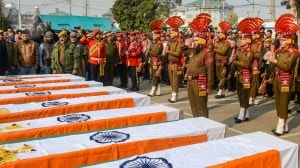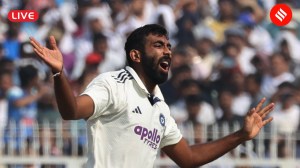Undaunted, they worked through night to heal the wounds
With the attack at prime South Mumbai locations with its scarce super-speciality hospitals, the dead and injured started piling up at government hospitals and officials faced the daunting task of shifting the dead and injured across the city.

JJ Hospital premises turned a mini-meeting centre for medical officials as they huddled in the dean’s room to manage the injured
With the attack at prime South Mumbai locations with its scarce super-speciality hospitals, the dead and injured started piling up at government hospitals and officials faced the daunting task of shifting the dead and injured across the city.
Twenty four hours since the terrorist attack began at VT station, Oberoi Hotel and Taj Mahal Hotel, city’s hospitals have been coping with 254 persons injured and 110 persons dead.
All the victims were first rushed to St George Hospital, a small state-run hospital which lacks enough manpower and infrastructure to handle the load. Within a couple of hours, the hospital was dealing with 50 dead bodies.
“It was the closest hospital in the vicinity. However, it cannot accommodate those many injured or dead. In the middle of the night, we had to plan how to shift all the bodies to different mortuaries and the injured to JJ Hospital,” said A M Khan, principal secretary, state government. The state administration debated between the civic-run King Edward Memorial hospital and JJ Hospital. The conveniently located and state-run medical college and JJ Hospital took on the maximum load of injured persons as well as the important post mortems. Some patients were also shifted to private hospitals like Jaslok and Bombay.
“I was near the VT station when the firing began. I was with a friend and we fled on our bike and made our way to the hospital. But the time I reached the hospital, about three persons had already been brought to the hospital from the Mazgaon blast site,” recalled Dr Shashi Pawar, who has been manning the JJ Hospital’s emergency room for close to 24-hours.
The JJ Hospital premises turned into a mini-meeting centre for government medical officials as they huddled in the dean’s room to make plans of managing the injured and celebrity visits. “Then we started getting bodies and patients after midnight. Since then, we have been at work.”
Unsure of how much blood they would require through the night, hospital officials sent out messages for more blood. “We did not have an estimate on the amount and nature of injuries. We knew we would need blood in case there would be huge number of injuries,” said Dr H S Gavai.
Dr Gavai, on night duty at the casualty ward of the hospital, first received the call at 10.30 about the developments, and to expect patients. “We immediately activated our emergency control and also opened up the 20-bedded emergency control room. Apart from this, one of us was co-ordinating with panel doctors, honorary and other doctors. All professors, lecturers and resident doctors were asked to report immediately,” said Gavai.
Dr Gavai along with Dr Pawar have been handling the casualty and emergency departments at the hospital for close to 24 hours now.
Comparing it to the blasts in Mumbai two years ago, Khan said “At that time it was really unmanageable as there were 800 injured with very serious injuries at 23 hospitals. The patients today are not that serious. However, the manangement is always an issue.



- 01
- 02
- 03
- 04
- 05




























